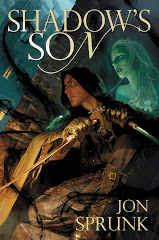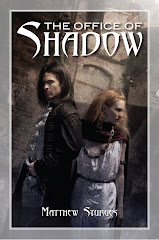Travellers’ Rest
James Enge
Download this story as a free epub or Kindle format ebook in celebration of Pyr's 100th title!
INTRODUCTION
MAKING A VIRTUE OF WEIRDNESS
The story you are about to read features James Enge’s wondrous character, Morlock Ambrosius. Morlock is a swordsman, an exile, a hunchback, a drunk, and a wizard, though he himself would use the term “Maker” and say he is a master of the two arts, Seeing and Making. He is a modern descendant of the sword and sorcery adventurer that was birthed in the pages of Weird Tales magazine, and Enge himself has been favorably compared to Fritz Leiber, Jack Vance, David Eddings, Steven Brust, and, interestingly, Raymond Chandler. His tales of Morlock the Maker have appeared in Black Gate magazine, in the anthology Swords & Dark Magic, and elsewhere, and Morlock features in the novels Blood of Ambrose, This Crooked Way, and The Wolf Age. Speaking of the novel The Wolf Age, Locus magazine wrote, “One of Enge’s great virtues as a writer is weirdness—he’s not afraid to do the unexpected, and his imagination is formidable. But there’s an underlying emotional power here, too. The author excels at depicting the bonds of friendship, the pain of betrayal, and the tragedy of well-laid plans going awry, and that emotional payload is what makes this novel into more than just an entertaining adventure story about a guy with a magical sword who fights monsters.” Which is not to say that there isn’t a magic sword, because there is, and where Morlock goes, rest assured there are always plenty of monsters. This story, “Travellers’ Rest,” is no exception. Chronologically, it takes place some years before the events of the novels. If you are new to Morlock, it should make a fine introduction to Enge’s creation, and if you are not, you will be pleased to see the return of at least one old friend. Either way, we hope that you enjoy it.
Sincerely,
Lou Anders, Editorial Director
Pyr, an Imprint of Prometheus Books
Download this story as a free epub or Kindle format ebook in celebration of Pyr's 100th title!
TRAVELLERS’ REST
The awkwardly made maker and his dwarvish apprentice were passing through trackless green fields peppered with large, slow-moving shellbacked beasts. Ahead, scattered around the junction of two roads that met in the shadow of the nearby hills, were some ragged brick buildings. The town, if that’s what it was, looked worn, weather-bitten, barely populated.
The apprentice—a gray-faced, brown-bearded, dark-eyed dwarf named Wyrth—said, “Master Morlock, let’s go on to the next town.”
“No.”
“Morlock, those beetles are taller than I am. Imagine what the bedbugs are like! Next town, please.”
“I believe these are cattle. Note the udder on that one.”
“I have better things to do than look at the private parts of cows! Um. If that’s an udder, there’s another one sprouting from the beast’s other side. Are you sure they’re cows?”
“No. They seem to be chewing cuds, though. If you can bring yourself to look.”
“You may practice your wit on me as you like, Master Morlock. It needs the practice, as God Sustainer knows. I still vote for the next town.”
Since voting had nothing to do with the matter, Morlock proceeded with his loping irregular stride toward the buildings clustered at the town’s center. His lack of reply was all the reply necessary: Wyrth was free to continue to the next town if he liked, but Morlock was stopping here.
“For the conversation, probably,”Wyrth speculated at Morlock’s crooked shoulders and followed him into town.
Two roads met at the town’s center, where there was a fairly large hostel several stories high. But the facade was in poor repair, and the road running westward to the sea was ill tended and untravelled, carpeted with brown weeds. The road running north toward the hills was in a slightly different condition: the weeds carpeting it were more of a reddish gray.
“Next town,” Wyrth muttered rebelliously, but followed Morlock through the broad open door of the hostelry into the shadows within.
One of those shadows was snoring behind a counter. Morlock rapped a knuckle on the counter and the shadow jumped like a startled rabbit and, rubbing its eyes, said in a professionally suave voice, “Gentlemen! Gentlemen! Your pardon!Welcome to Travellers’ Rest at Boulostreion! What can we do to assuage the weariness of the long roads you have travelled to reach us?”
“Couple rooms,” Morlock said. “Lunch.”
“Lunch. Yes. Lunch. Let’s see. Right now it’s about—”
“Noon.”
“Noon. Not really? I’ve slept the morning away. I hope my good wife and daughters have not done the same. I mean—daughter. Never mind. One moment while I check. Before I go, may I ask how long you’ll be staying with us?”
Morlock opened his hands and shrugged. When the hosteller realized that was all the response he was going to get, he shrugged himself and hurried off.
“If there is cooking going on in this establishment,” Wyrth remarked, “then I’m one of those cow-beetles back there. I didn’t even see a thread of smoke from the chimneys as we approached.”
“They don’t see as many travellers as they once did; that’s clear,” Morlock replied.
“Maybe travellers know something that we don’t and tend to travel a little further down the road? To the next town perhaps?”
Morlock travelled a little further into the hostelry, where there were many tables and benches set up in a roomy (if somewhat dim) dining hall. The benches, tables, and floor were all scrupulously clean, as far as Wyrth could tell. He was about to comment on it when Morlock gestured at something moving in the shadows nearby. It was some sort of insect fringed with dozens of feathery tendrils; it spun endlessly across the shadowy floor.
“Does it eat the dust?” Morlock wondered. “Or just pick it up to deposit elsewhere?”
“What else does it eat besides dust?” Wyrth countered. “How will you feel when you find one crawling up your thigh in the middle of the night? The thing’s bigger than a sausage tray!”
Morlock hung his sword belt over a nearby chair, then unshouldered his backpack and took a cold-light from it. He tapped the crystalline cylinder and set it on one end of the table, giving light to the room.
Wyrth grumbled a little but eventually slid off his own pack and engaged Morlock in conversation on various topics: the weather; the state of politics in the imperial capital when they’d left it; the likelihood that the cows they’d seen were actually blood-drinkers, like bovine mosquitoes; the amount of blood it would take to satisfy such ravening beasts; and so on.
Morlock had little to say about any of it except, “They won’t be interested in my blood.” This was perfectly true: Morlock’s blood tended to set things on fire, and few parasites made the mistake of putting the bite on
him—none made it twice. The same was not true ofWyrth’s blood at all, and reflections on this topic led him to fall into an unusually gloomy silence.
Meanwhile the hosteller returned to his counter and, not finding Morlock and Wyrth, cried out in vexation and something like despair.
“Mine host!” Wyrth said. “We’re over here.”
“Ah!” The hosteller leapt eagerly toward them into the circle of light cast by Morlock’s cold-light. He was followed by a shorter, thinner, paler, female echo of himself. “Ah, gentlemen—may I know your names?”
“No,” said Morlock.
“Oh!” said the hosteller. His plump reddish-brown face looked baffled.
Wyrth was annoyed at his master. The man had his reasons for not giving his name every time he was asked, especially south of the Dholich Kund, but you’d think that by now he’d have figured out some more diplomatic way of answering.
“Canyon keep you, you surly old bastard,” Wyrth muttered at Morlock. “Mine host, this gentleman here is a secretive fellow, but he’s not dangerous when well fed and kept away from poisonous or predatory insects. I just mention that in passing, in case there are any around here. I’m his apprentice in the many arts of making, God Avenger pity me for it. My name is Wyrth, and I don’t give three chunks of chaos who knows it.”
The hosteller was relieved to meet someone of his own talkative turn of mind. “Well! Gentlemen, I am Sunlar; this is my house. Here is my younger daughter—I mean my daughter, Raelio; she will see to your comforts, within reason, of course.”
Wyrth assumed this meant that the girl was not on the menu. That was fine with Wyrth: he himself never dated outside his species, and Morlock’s vices did not include preying on children. “Despite appearances, we’re reasonable people,” Wyrth said to the hosteller, hoping he could make himself understood without any disgusting particularities.
“Excellent, excellent,” said Sunlar. “Well, I’ll leave you with Raelio. I have to go help my—I have to help with the—Some matters await my tending.” He bounced off toward the back of the house.
The child watched him go, amusement and affection gently lighting her dark-eyed weary face.
“He’s awful excited,” she remarked.
“We’re the first guests in a while, I suppose?” Wyrth said.
“I wasn’t supposed to say. If I did, I’d have to count back a month or two. And they snuck out without paying, the scasp-chewing branticules. Still, it was nice to have someone in the house for a while. How long are you staying?”
“A while,” Morlock said. “What’s to eat?”
“I couldn’t exactly say. I was supposed to tell you that the house special was the best thing I’d ever eaten, but I can’t exactly say that because I don’t know what it is and I don’t want to lie.”
“You’re an honest waitress,” Wyrth said.
The girl nodded. “Morlock drags you to hell if you lie. I don’t want to go to hell. So I’m not lying anymore.” Her tone was cool and pragmatic; she had thought the matter through and this was her decision about it.
“Er,” Wyrth said wittily. He was taken aback, and somewhat annoyed to see that Morlock himself was not: the crooked man was used to hearing these wild tales about himself. “Morlock drags liars to hell, does he?”
“Everyone knows that. My mother says so.”
“But—you don’t anticipate death soon, do you? I mean—”
“It can happen to anyone. At any time. Isn’t that true? They can come for you and then you’re gone. So we have to be happy and good while we can. My mother says so.”
“Well. Well. Right she is, of course.”
“Who are they?” Morlock asked.
“Shut up, you old fool; you’ll frighten her. Never mind him, Raelio. He doesn’t mean any harm, as a general thing, but you have to practice ignoring him.”
“They come for you from the hills,” the girl explained to Morlock, ignoring Wyrth instead. “And then you’re gone. We have to hope that you are dead. That’s the best we can hope for. That’s what my mother says.”
“And is Morlock one of those who come from the hills?” Morlock asked. (Wyrth had to admit that his interest was perfectly natural.)
“No, silly. They kill you in the hills and then Morlock and the angel fight over your soul. But the angel won’t fight for you if you’re a liar, so then Morlock gets you. My mother says so. Do you want something to drink? I was to start you with drinks and then inveigle you in innocent conversation. I guess I inveigled first, but I don’t know what that means exactly.”
“Inveigled is—it means—Well, anyway, what have you got to drink?”
“We have wine—”
“No wine,” said Wyrth firmly, looking sideways at Morlock.
“—the beer’s not bad; I had some at breakfast—”
“No beer.”
“Well we have a little mead from over the border, but—”
“No mead. Have you got anything but strong drink? Water, or something of that description?”
“Water’s all right, I guess,” the girl said dubiously. “Our well’s a little murky and we have to pay Gar Vindisc to use the stream.”
“Get us some of his good water, my dear; we’ll pay you triple whatever it costs.”
“Her. Her water. Gar Vindisc is one of the Old Women. What do you think ‘gar’ means?”
“If I told you I knew, my dear, I would have some trouble with Morlock right quick.”
“Wouldn’t you rather have thrinnel? I love thrinnel. It’s even better than beer!”
Wyrth didn’t know what thrinnel was so he asked, “Is it strong drink? Can you get drunk on it?”
“No, no. Babies drink it. It’s yummy.”
“Well, if it’s yummy then we must have some. Now we move on to shiftier ground. What do you think they’re going to offer us for lunch, Raelio?”
“Anything you want that we’ve got. The da is that excited to have people under the roof again.”
“What’ve you got, then?”
“Shellback brisket, shellback liver, shellback kidneys, shellback steaks and tripe, shellback-tail soup—”
“Shellbacks are those remarkable cattle we saw coming into town?”
“I guess.”
“What is there beside shellback?”
“Might be fish. Dry salted fish, from before winter.”
“Seethe some of that in Gar Vindisc’s good water and bring it to us. Bread, too, as long as you don’t make it from shellbacks.”
“And two shellback steaks,” Morlock added. Wyrth looked at him with a sense of deep betrayal, but Morlock shrugged his crooked shoulders and said, “Might as well see if it’s edible,” and Wyrth had to concede his point.
Raelio fetched them wooden mugs of thick yellowish fluid (“Thrinnel!”) and ran off to carry their order to the back of the house. Both the master maker and his apprentice could now detect the presence of several fires in the house, and anyone with ears could have detected a man and a woman shrieking at each other, with excitement rather than rage, amid the clanking of much cookware. A brief silence prevailed, in the heart of which Raelio could be heard reciting their order. There were some whispered consultations and the clanking resumed, even more purposefully than before, but with less shouting.
“What is this stuff?” Wyrth asked, fearfully peering into his mug. “Pus? Does ‘yummy’ mean what I thought it meant?”
“It’s buttermilk,” said Morlock after sipping some. “Reasonably fresh buttermilk.”
“Buttermilk?” demanded Wyrth, outraged. “And they serve it in a public establishment where anyone might drink it by accident? Civil law must have broken down entirely hereabouts.”
“It’s not so bad. Better than wine. Or beer.”
“Er. Yes.” Wyrth was particularly worried about Morlock getting drunk these days.
“Could you map a four-dimensional image of it onto three dimensions?” Morlock asked.
“A four-dimensional image of a fluid?” Wyrth wondered. Then he realized that lesson time had begun. “Or a fluid in a four-dimensional container? Well, why not? What should I use as a medium?”
“Something particulate. You can use a cementing spell to retain the shape.”
“Yes. If only we had some salt or something. Is there some in your pack?”
“There is a dish of it at your elbow.”
“So there is!”
Someone else entered the front of the hostelry while Wyrth was occupied in his model making.
“Must be a happy day for ourn host,” Wyrth remarked. “Two sets of guests in one day.”
“Eh,” said Morlock, but it was the way he said it.
“What do you mean? What’s wrong?”
“Listen.”
Wyrth listened. He couldn’t catch many words, but Sunlar’s voice sounded angry or frightened. The stranger’s voice was low, steady, implacable. A third voice rang out, a woman’s, loud enough for her words to carry to the refectory.
“We’ve done our part!” the woman shrieked. “We gave you our other one! Leave us alone! You said you’d leave us alone. Leave us alone!”
“Morlock,” Wyrth said warningly. “Not our problem.”
But the crooked man was already standing. Wyrth knew the crazy look in those pale gray eyes, and he feared the worst. At least Morlock left his sword hanging on the chair back, Wyrth reflected, which showed he wasn’t intending to kill anybody right away.
Morlock walked back up the refectory hall and into the shadowy entrance hall, Wyrth following reluctantly. The door to the street was standing open and a huge hulking man stood in it. The day was warmish, but his bulk was covered by a full cloak and his flat dull-eyed face showed no suffering from heat. It showed no feeling at all as the stranger said, “I’ve come to take her, that’s all. You know what he says. She is to come with me to the hills.”
Sunlar, Raelio, and an older women that Wyrth guessed must be the girl’s mother were huddled together behind the counter, as if that could protect them from the stranger.
“What is this?” Morlock demanded.
The stranger turned to him. He didn’t seem surprised or even interested in the interruption. He said, “I am to take the girl to the hills. Kyrkylio says so, and I do as he says.”
“That will not be convenient for me,” Morlock said. “The girl is to serve me lunch.”
“The old woman can serve it.”
“She’s cooking it.”
“The old man can serve it.”
“He has other important duties around this busy house.”
“Oh.” The stranger paused, evidently not wishing to be unreasonable. “How long will your lunch take? I can bring her to the hills after you’re done.”
Morlock was usually prepared to be unreasonable, as Wyrth well knew and as the stranger was learning. “I will require lunch tomorrow also,” the crooked man said implacably, “and the next day.”
“How long are you staying here?”
“As far as you’re concerned, forever. Go back to the hills. Tell Kyrkylio that he may not have the girl.”
“He won’t like that.”
Morlock shrugged.
“He gets angry.”
This time Morlock didn’t even bother to shrug.
“I get angry, too,” the stranger said. “You treat me unkindly. I am not used to that.”
“Learn,” Morlock suggested.
“No. I’m done with learning.” The stranger drew a sword from under his voluminous cloak and pointed it at Morlock. “I learned how to cut people open when they are unkind to me. That’s all I need. Now people are kind to me or I cut them open. Which is it for you? What do you say?”
What Morlock said was, “Tyrfing!”
Wyrth dropped to the floor. Morlock’s sword, Tyrfing (its black-and white blade glittering in the light from the open door to the street), flew over his head and into Morlock’s open hand.
The stranger looked without dismay at the sword that had suddenly come to Morlock’s hand when called. “I see it. You are a sorcerer.”
“I am Morlock Ambrosius,” the crooked man replied.
The man and the woman screamed together and hid their faces. The girl seemed frightened, too, but she kept watching.
“I have a name, too,” the stranger said slyly. “A name that makes people scream, a name they are afraid to say.”
He tossed back his cloak, and Wyrth saw that his frame was not so very large after all. What made him seem bulky was the fact that he had six arms, each of them armed with a sword. “I am Iagiawôn,” the stranger said triumphantly. “Iagiawôn the Many-Handed!” He advanced, spinning the blades as if his wrists were on pivots.
“I told you,” Wyrth shouted at Morlock, “we should have gone to the next town!”
“Get them out of here,” Morlock said and retreated a step or two, Tyrfing raised to guard against the rippling hedge of blades.
“That means you!” Wyrth shouted at the family huddling behind the counter. But only the girl seemed to hear him, and she was caught tight in her parents’ double embrace.
Wyrth muttered a brief but sincere curse and dashed across the entryway, sparing a moment to kick at the back of Iagiawôn’s left knee, spoiling his six-fold thrust at Morlock. Unfortunately it did no other harm; the joint had some sort of buglike carapace to protect it. Wyrth half expected one of the six freakishly mobile arms to swing around and stab at him with a sword, but that didn’t happen. When Wyrth realized it wasn’t happening, he knew that was important somehow, but he didn’t have time to think about it.
Wyrth dragged Sunlar and his wife to their feet and pushed them across the floor into the dining hall. “Is there a back door in here?” he asked the wide-eyed girl, there obviously being no point in addressing a sensible question to the sobbing hysterical adults.
“Yes—” the girl began.
“What’s the point?” Sunlar wailed. “Morlock can find us wherever we go! Unless you think Iagiawôn can kill him?”
Wyrth lived on terms of irritable cheerfulness with life, and very few things really made him genuinely angry. But this was one of them.
“You snivelling swill-vendor!” he shouted up at Sunlar’s startled tearstained face. “Morlock is risking his life out there for you and your family, even though he probably doesn’t remember your names. And you’re in here hoping the monster who came to take your daughter—your second daughter as I understand it—you’re hoping he fulfills his wish and cuts Morlock open. Well, don’t worry about it. However the fight works out, you won’t have to worry about Morlock coming after you; all those old stories are lies. Go on; get out of here; run as far and as fast as you can. But remember: every day of your life from now on is the gift of Morlock Ambrosius.”
He turned away from the family and grabbed a heavy drinking mug molded (badly) from pewter. He ran back into the entryway and saw Morlock was continuing a circling retreat, dodging the occasional sixfold thrust.
Wyrth threw the mug as hard as he could at Iagiawôn’s head, hoping it would bash out whatever the insectile thug used for brains. Wyrth was not hampered by any superstitions about fair fighting.
Unfortunately, it did worse than no good. Iagiawôn turned slightly to face the flying mug and caught it in his spinning blades; it shattered like glass. One of the larger chunks bounced off Morlock’s knee and he staggered a bit. Iagiawôn gleefully stabbed at him with his sheaf of blades, but Morlock managed to keep his feet and fend off the blades with a sweeping slash, like a reaper mowing glittering deadly stalks of hay.
“I told you to get them out!” Morlock shouted to Wyrth past his antagonist.
Wyrth hesitated. That meant Morlock thought there was a real likelihood Iagiawôn would win the fight, and Wyrth and the others would be in danger. On the other hand, Wyrth thought he could better Morlock’s odds if he stayed. On the other other hand,Wyrth hadn’t been doing a very good job of helping so far. . . . How many hands was that?
Hands. Suddenly Wyrth realized the importance of something he had noticed earlier. Iagiawôn had six hands, but he couldn’t use them independently. When he moved them, he moved them all in the same way.
He shouted to Morlock in Dwarvish. “Hwaet! Vakt sorn knektan wyruma thledhan; dal sar aknekt ma kapt!” (Hey! The bug has six clever hands but just one stupid head!)
“Yes,” Morlock said. “Get. Them. Out.”
Wyrth was about to say they were out when he noticed the innkeeper and his family watching the fight from the doorway just behind him.
“Go,” he said, pushing them back. “Go, get out. It’s life or death for you.”
He led them into the dining hall, each clash of the blades feeling like a thrust through his own heart. But what could he do? If Morlock thought this was worth spending his life on, Wyrth had better make sure it was not for nothing.
There was a clatter that caused him to look over his shoulder. Iagiawôn had leapt up on the counter to rain cuts down at Morlock’s head. The monster must have been confident about the carapace protecting his legs.
But Morlock didn’t attack him directly. The crooked man jumped to one side and shattered the counter itself with a single slash of Tyrfing’s glittering unbreakable blade. Iagiawôn hit the ground rolling on his shoulder—he had a lot of shoulder to roll on—and was almost instantly on his feet.
Morlock grabbed a stretch of the shattered counter in his left hand, extended Tyrfing, and stabbed at his enemy. Iagiawôn caught the accursed blade in a sixfold bind. Morlock swung the length of wood he held in his left hand and buried the end of it in Iagiawôn’s skull. The six-armed swordsman slumped to the splinter-strewn floor. He was dead by the time Wyrth ran up to stand by Morlock.
“Are you all right?” the dwarf said to his craft-master. “That chunk of metal seemed to hit you pretty hard. Sorry about that, by the way.”
“It’s all right,” Morlock said. “Wyrth.”
“Morlock.”
“‘Out’ does not mean ‘part way into the next room.’ In case this situation comes up again.”
“How likely is that?” Wyrth shouted back, stung. “More important, how would I carry the news to my father under Thrymhaiam that I ran away while you fought to your death against a six-armed beast?”
“I’d prefer that to seeing you die next to me.”
“But I wouldn’t, and neither would my father, as well you know.”
“You think too much of your father’s opinion.”
“And you think too little of it. No, I’ve heard what you said, Master Morlock, and I’ll consider it. You’ll note I obeyed you sufficiently as to be no damn use at all, anyway.”
Morlock’s scarred face bent slightly in a one-sided smile. “It’s a start. Let’s haul the meat into the sideyard. If that suits you, Sunlar?”
The hosteller and his family had approached tentatively and were eyeing the dead body with interest and some dismay. Sunlar realized he had been addressed and jumped. Morlock repeated his question. Sunlar nodded mutely, and Morlock remarked toWyrth, “I want to have a look at his wrists, at least, before we eat.”
“They must be ball-and-socket joints, I guess.”
“Plainly. Though how the musculature attaches is not plain at all, at least to me.”
“Will we have time to make a few incisions?” Wyrth wondered.
“Yes.” Morlock gestured at the greasy smoke billowing from the back of the house. “Lunch will be a little late.”
Sunlar and his wife both shrieked and ran back into the kitchen, calling for Raelio to follow them. She did, reluctantly, keeping an eye on Morlock and Wyrth as they hauled the dead body of the monstrous bravo outside.
~~~
Lunch, when it arrived, was more splendid than anything they had ordered. The fish were fresh, caught that very day, Wyrth guessed (from Gar Vindisc’s pricey stream, possibly). The shellback steaks were, the finicky dwarf had to admit, more than passable, and there were several of them. Wyrth kept fending off a stream of offers of expensive wines and exotic beers. But the thrinnel ran like water, and the water ran like more water, and there was nothing murky about it. Dessert was a plate of spicy custards and a bowl of
multicolored fruit, none of which Wyrth recognized but all of which were juicy, tart, and delicious.
Morlock ate sparingly. Killing a man didn’t put him off his appetite, and Iagiawôn was a borderline case anyway, but food was just fuel to Morlock and whenever he stopped being hungry he just stopped eating. Wyrth had more expansive ideas, and finished off whatever Morlock left behind.
Through the meal they discussed how Iagiawôn had been put together. He had clearly been built through a series of surgeries; the network of scars was easy to read in his skin and his bones. By this Kyrkylio, no doubt—a lifemaker who had a dwelling somewhere in the hills north of town, it seemed.
This much they discovered by inveigling Raelio in innocent conversation, but she wasn’t much inclined to talk to them. But as Wyrth was in the final stages of his victorious campaign against the magnificent lunch, she
looked straight at Morlock and said, “Is my sister still alive? They took her to the hills. I figure you’d know if she was dead. She was a terrible liar.”
Wyrth would have said something, but his mouth was full of custard.
Morlock, whose mouth wasn’t, shrugged. “I don’t fight angels over human souls,” he said.
“My mother says so.”
“Who gave your sister to Kyrkylio?” Morlock asked.
The girl turned away. “No one. No one. The monster, he—he took her. My mother said it was for the best. She said they would leave us alone now.”
“Why do the townspeople let the monster prey on them?”
“It was part of a deal, a long time ago. The sorcerer he . . . I guess he gave people stuff, things they could never get otherwise.”
“The shellbacks,” Morlock suggested.
“Yes. Yes. I guess so. Other things, too. And they. They wanted to pay him but he wouldn’t. He didn’t want money. This was a long time ago; my mother said so. They said they would let the sorcerer take people once in a while. It was travellers mostly. For a long time it was only travellers. But now no one comes here. So the monster he . . . The sorcerer sends him out and he takes people. And people let him mostly. But you didn’t.”
“I hadn’t had lunch yet.”
“You’re a liar!” the girl shrieked, tears running down her face. “Everyone lies! My mother said . . . about my sister . . . like it didn’t even matter! She’d’a said the same when he took me. When I was gone, as if I was never here. And you. I saw your face. I saw it. You hated him. Like I hated him. And you hit him. Like I wanted to hit him. When he took my sister. I wanted to hit him and hit him and hit him until he’s dead and leaves us alone, just leave us alone, why won’t he leave us alone!”
“I hated him,” Morlock admitted. “It’s a weakness. But now he is dead and my hate is dead.”
“Mine isn’t,” the girl said through gritted teeth. “I went out to the yard after you were done cutting him, I was so glad you cut him, but I went out afterward and kicked him and kicked him and spit on him and cursed him
and kicked him. But it didn’t matter and now I still hate him. I think it’s because he took my sister and she’s still gone. He didn’t take your sister.”
“No,” Morlock agreed. “He didn’t.”
Wyrth would have liked to see the late unlamented Iagiawôn try to abduct Morlock’s sister, Ambrosia Viviana, dark eminence behind the imperial throne of Ontil. The ensuing mayhem would have been entertaining to everyone except Iagiawôn. He almost said so, but he had noticed Morlock’s brief responses were getting the girl to talk more thanWyrth’s inveiglements had.
“You didn’t say is she dead,” the girl said quietly. “I figure you know because she is such a liar. Her name’s Iuinoe. I love her, but she lies all the time, like about the dance and Vikels’s harp and boys and things.”
“I don’t know,” Morlock said.
“Can you find out?” asked the dark-eyed weeping girl. “Can you find out is she dead? My mother says she is, says she must be, but I don’t know. I don’t know. You don’t know. Nobody knows. I want to know. I want her back and I’m sorry, I’m so sorry what I said to her about Vikels’s harp.”
“I guess we can find out for you, Raelio,” Wyrth said, reading the inevitable in Morlock’s scarred taciturn face. “It’s the least we can do for this splendid lunch.”
~~~
A passing crow agreed to carry a message to Kyrkylio’s lair in the hills. He knew the place well and enjoyed going there; it was always surrounded by interesting piles of offal that exhibited a pleasing variety of decay. If he were not a crow of few squawks, like Morlock himself, really, he could have expanded in some detail about the odd sorts of carrion Kyrkylio threw out. For instance, there was this one time—
Wyrth agreed hastily that there were times when concision was really the thing. Morlock often had to warn him about running on and boring people with extraneous detail, especially about subjects like carrion, which are really more interesting when they’re actually present.
The crow, not the swiftest bird in the sky, finally took the hint and flew off with the message clutched in his claws. The message proposed a meeting between Morlock and Kyrkylio.
Less than an hour later, a shimmering blue beetle flew in through the doorway of the Traveller’s Rest. It carried in its horns an oath, specific and binding, and a message agreeing to the meeting if the oath was sworn. An ambiguous clause in the oath would have made anyone who swore it subject to Kyrkylio’s control. Morlock struck out the clause, and sent it back via the beetle along with a note, Agree to meet on fair terms or we will meet with no terms. I am Morlock Ambrosius; I will not tell you twice.
Wyrth was skeptical of Morlock’s diplomacy, but when the blue beetle returned it carried a reasonable oath that self-bound the swearer at fearful cost not to harm Kyrkylio while visiting in his lair, except in self-defense. A talimprint interwoven with the text showed that Kyrkylio had already taken an oath swearing not to harm Morlock and Wyrth while they were in his lair except in self-defense.
“Too swift; too reasonable,” said Wyrth. “We shouldn’t do this.”
But they did, and the eastering sun of midafternoon saw them climbing the slope to Kyrkylio’s hill-cave lair. The adept met them, standing carefully within the shadows over the threshold, but voluble in welcome for the maker he considered his colleague. Wyrth he didn’t so much as glance at, nor waste a word on.
And Kyrkylio was a man of many words, to the extent he was a man at all. He liked to emphasize his words with a dramatic sweep of his long, bristly proboscis, and when he had said something especially decisive he
would clack his horns together—as punctuation or something, Wyrth guessed.
All this, and the spotted golden carapace that adorned his back, and the four arms with their curving clawed fingers, made it hard to think of him as a man. The lower pair of arms seemed more insectile, flexible but armored with yellow chitinous plates. The upper arms were more nearly human, though they were textured with brownish crisscrosses that seemed to have been incised into the scaly pale skin.
The eyes on either side of that buglike nose were pale blue and weary looking, deep in dark sockets. And the adept’s pale sagging cheeks were lined with pain or age (or both). But his voice soared with enthusiasm as he guided Morlock around his cave, rather like a boy showing off his bug collection.
Except in this case it was more like a bug with a boy collection. Anyway, there was an object in a wooden cage that had certainly been a boy at one time, at least in part. But the back of his head had been removed along with its burden of brain. In its place was a forest of yellowish tendrils, each one ending in a red mouthlike opening. The mouths murmured quietly to themselves as the tendrils waved back and forth, but it was not clear that the sounds had any meaning. What had been the boy’s face was as hard and immobile as a piece of wood; there was no life left there.
“And here is something that might interest you,” Kyrkylio was saying. He gestured with one of his right arms while the other hung down, slowly clenching and unclenching its insectile fingers. “I developed it as an attachment for poor Iagiawôn.” Wyrth finally managed to tear his eyes away from the adept’s hands and follow his gesture. Morlock was already bemusedly examining the thing; it lay pulsating on a glass tray. It looked like a crown or necklace and it was made chiefly of eyes, strung like beads on a gleaming cable of nerve.
“It was intended,” Kyrkylio explained, “to give him a complete range of vision and, ideally, let him watch for dangers even when he was asleep. But you inconveniently slew him before I had a chance to perfect the instrument.”
“Doubt he could have used it,” Morlock said, looking away toward a glass jar or cage that stood on a rickety shelf nearby.
“Why do you say so?” Kyrkylio replied, stung in his makerly pride.
“Incomplete command of his augmented limbs. A lack of innate capacity maybe. The limbs themselves were well made.”
Wyrth was fascinated by the struggle in Kyrkylio’s face. It was as if two different people were trying to talk through the same mouth. The face twisted; the mouth issued a rasping quack that was not clearly even intended as a word.
“Thank you,” Kyrkylio said at last. “Iagiawôn was inadequate in many ways. A merely human brain seems unable to effectively master multiple limbs. They rarely use to advantage the ones they were born with.”
Wyrth was inclined to agree about the deficiencies of the human brain; he’d encountered few he could cordially respect. But since he was standing next to one of them, he discreetly kept his meat-hole shut. Also, he thought it was interesting that Kyrkylio referred to humanity as a group separate from himself. Was he a man who’d become part bug, or was he a bug who’d grown to resemble a man? The point was moot, perhaps. The speculations whirled within Wyrth like a cyclone, but he resolved not to speak. It was for
Morlock to pursue these avenues of investigation, for Wyrth to watch and learn from the master.
“Hm,” said Morlock, still gazing with interest at the rickety shelf and the glass cage on it.
“That’s a big word for you,” cried Wyrth, goaded against his will into speech.
Kyrkylio had not once looked at Wyrth and he didn’t do so now. But he said to Morlock, “I can resect as well as augment, in case your servant’s loquacity troubles you.”
This was the perfect opportunity for Morlock to engage in some rallying at Wyrth’s expense, but as usual he failed to rise to the occasion. “If you threaten my apprentice again,” Morlock said flatly, “I will hold your oath violated.”
Kyrkylio unfolded his wings in vexation, then refolded them. “I meant no threat. Certainly I would rather avoid a conflict, if possible, as I assume you would.”
“Hm.”
“You killed my servant Iagiawôn, but I do not resent it. I know your reputation, and no doubt he gave you some cause of offense. Live by the sword; die by the sword. Let me show you—”
“What are those?” asked Morlock, pointing at the glass cage.
“Those. Oh. That. Yes. Well.”
Wyrth took a closer look at the cage that so fascinated Morlock. Inside it was a cloud of bugs that seemed to consist largely of wings and teeth. They were attacking the inside of the cage and had succeeded in etching the inside of the glass. Behind them, at the bottom of the cage, was a greenish lump of flesh with a single human eye.
“That was a failure of mine, I’m afraid,” Kyrkylio said. His lower, more insectile arms reached up and gently caught his upper, more human ones. Wyrth wondered if it was a gesture of concern or contemplation, like a man rubbing his hands together. “I attempted to make a single creature that was a collective of both sessile and motile parts. Unfortunately, the creature whose brain I used for the purpose was most unsuitable. It declined to reproduce and seems to resent me intensely. Periodically I must recage the collective, as the motile rovers eat through the glass. They would do me harm if they could. I could wish I had made their natural defenses a little less, oh, offensive.”
“Hm.”
By now the lifemaker’s insectile claws had sunk deeply into his more human arms, and a yellowish ichor began to exude from the scaly skin.
“I beg your pardon,” Wyrth said to Kyrkylio, “but you seem to be harming yourself.”
“What? Oh! That’s nothing. Er—thank you.” The insectile claws retracted suddenly (guiltily?) and Wyrth realized that much of the patterning on Kyrkylio’s skin must be from this sort of self-injury. The lifemaker was a being at war with himself. Wyrth wished he could bring this to his master’s attention somehow, but Morlock was still examining the rickety shelf.
“You should fix this,” he observed to Kyrkylio. “If the cage fell and broke, you’d be in a bad way.”
“Yes, yes, yes. I have plans to see to it.” The horns clicked irritably.
Kyrkylio showed Morlock a few more of his experiments that once had been men, women, and children and then said, “But I suppose you will be eager to tell me the purpose of your visit. It is pleasant for solitary adepts like you and me to visit and talk shop, but we both have our work to do.”
“I’ve come about a girl you took from the town. Her name is Iuinoe.”
“I’m afraid I don’t keep track of my subjects’ names. I give the successful ones new identities, and the others I dispose of.”
“That’s a problem.”
“I hope this is not some sort of, well, rescue mission. Our oaths were quite explicit, and I have instrumentalities to protect me if you violate your oath.”
“I said I’d ask about her. So I’m asking.”
“Well. I’m not really sure I can help you. The adults in town mostly surrender their children to me when they have a choice between that and surrendering themselves, so a lot of girls have passed through here. When was she taken?”
“Don’t know. She was from the hostelry, though.”
“Oh! The one with the sister!”
“Yes. She has a sister.”
“Now I know the one you mean. I would have shown her to you, but she isn’t finished yet. Come along; we’ll have a look at her.”
Kyrkylio grabbed a lamp with one of his hands and conducted them (or Morlock, really; he still hadn’t looked directly at Wyrth) up a short corridor to a kind of cell. It was lined with glass, like the cage that held the malefic collective being.
Inside the cell was a sort of animal. It looked like a cross between a partially shaven ape and a spider. It had eight legs, except the legs were really arms, and at the end of each was a human hand. The creature’s head was set on a hump in the middle of its back. When it saw them, its eyes gaped wide in fear and horror and it backed away, twisting its head from side to side. Its mouth moved, but Wyrth could not hear the words through the glass cage. It seemed to be saying “Help me!” . . . or perhaps “Kill me!”
“Now, you will notice,” Kyrkylio said, with professional enthusiasm, “how ineffectively she uses her additional limbs. She has a powerful emotional impetus to cover herself, but how awkwardly her limbs answer to her desire! She really only uses one pair fully; another pair she uses like legs; and the others she hardly uses at all. I’ve tried a number of experiments to train her in their use, but they all failed and now I’m convinced there is a real lack of cerebral capacity for the purpose.”
Morlock said nothing, but Kyrkylio hardly noticed.
“So the next natural step would be to augment her cerebrum, or perhaps add a new one. I’ve tried attaching several external grafts, but she rejected them all—you may be able to see the scar tissue just there at the base of her neck. So my latest thought, since she talks so much of her sister, was to make use of the younger girl. The two brains seem more likely to be complementary. I hope you won’t ask me to reconsider; I’m quite set on the project.”
“I’m set against it.”
“Well. Perhaps I can find a way to persuade you. Will you be in town long?”
“Long enough.”
“For the sake of collegial relations, I’m willing to suspend this project for a time. I don’t promise to end it, of course: I expect some collegiality in return! But perhaps we can negotiate some sort of agreement.”
“Maybe,” Morlock said. From his tone Wyrth knew this meant Maybe when the ground gapes wide and swallows the three moons, but Kyrkylio didn’t seem to be aware of it. The lifemaker’s bristly nose-heavy face beamed with professional cordiality, or something.
Kyrkylio escorted them to the exit of his cave, burbling happily about the nightmares he was compounding in its various nooks. As they passed by the rickety shelf, its glass cage buzzed with the attacks of the vengeful collective within.
“I can remove that for you,” Morlock said.
“As a gesture of good faith?” Kyrkylio seemed taken by the idea, yet also reluctant. “That’s very collegial of you. Very collegial indeed. I must say, I don’t know how all those horrible stories about you got started.”
Morlock shrugged. “I would take it out of here. That’s all. You’re in danger from it every moment, you know.”
“I know. But I hate to give up on a project, even when I know it’s failed.” Kyrkylio looked at the glass cage with longing and hatred. His insectile limbs started clawing at his human ones again, but in the throes of making his decision, he didn’t seem to be aware of it. “All right,” he said suddenly. “Please take it away. I’ll be grateful to you for it.”
“Eh,” Morlock said, and picked the glass cage up from the sagging shelf. The eye in the greenish fleshy mound looked sharply at him through the etched glass, then sharply at Kyrkylio. The vicious rovers redoubled their attacks on the glass wall.
“Now,” said the weevilly lifemaker as they reached the threshold of the cave, “I decline to annul my oath, and I hope you’ll do the same. It’s a good foundation for a collegial alliance, I think. We’ll visit again soon, and perhaps I can change your mind about my little project.”
Morlock said nothing to this; instead, he and Wyrth walked out of the cave into the blue of gloaming. Kyrkylio stood on the far side of the threshold and watched them for a moment, then turned back toward the inner cave.
When Morlock had taken three strides away from the cave threshold he turned and tossed the glass cage back into the lifemaker’s lair.
The cage shattered with a satisfying crash. It was followed by Kyrkylio’s shriek, “Your oath! Your oath! I invoke it!”
“I’m not in your cave, Kyrkylio,” Morlock called. “Nor am I harming you. Reach an agreement with your failed project.”
From where they stood, the maker and his apprentice could see the battle between the lifemaker and the life he had made, or marred. The fierce little rovers were chewing through Kyrkylio’s winged carapace. He could not reach them with either set of arms, his horns, or his proboscis, though he tried with all of them. He smashed his back against the walls of his cave, against tables in his workshop, and he did succeed in smashing some of the rovers as they fed on him. But others made it through his shell, and soon they were safe
inside the lifemaker’s body. He shrieked in horror and pain and something like ecstasy as they tore through him, and finally his body fell across his own threshold, twitching and fluttering its wings uselessly. Presently it grew still. Moments later, amid a burst of yellowish ichor, a cloud of rovers emerged from the cavities where Kyrkylio’s eyes had been. The lifemaker was dead.
The cloud of ichor-stained rovers hovered in midair, looking out of the cave at Morlock and Wyrth. The dwarf was wondering if they shouldn’t retreat, lest they become the next item on the rovers’ menu. But they suddenly turned away and descended on the ruins of the glass cage.
Going back home? Wyrth wondered. Where else did they have to go?
Morlock stepped over the corpse on the threshold and Wyrth hesitantly followed him. As he did, he saw what the rovers were doing. They were attacking the greenish lump with the human eye—the sessile portion of their collective self, if Wyrth had understood the now-dead lifemaker.
Suddenly, as one, the rovers ceased to move. The half-eaten fleshy lump was also still.
“Suicide,” Morlock said. “Its vengeance on Kyrkylio was complete and it had nothing else to live for.”
Wyrth nodded slowly, and then he said, “God Sustainer. There’s a whole cave of things like that in here.”
“Yes, we have work to do. Go down to the Travellers’ Rest and get our backpacks. Tell them as little as you can.”
Wyrth gaped at him for a moment. The crooked man opened his hands and waited. Wyrth finally took the hint. He ran out of the cave and sprinted down the hill. When he returned, Morlock had already begun the long grim task before them.
~~~
A few days later, lost children and strangers began to wander down from the hills into the half-empty town of Boulostreion. All were seamed with scars where they had been patched together by Morlock Ambrosius and his apprentice.
Some said this was the vengeance of the Evil One on them for accepting the wicked bargain with the slain lifemaker, and some said it was a trick of Morlock’s for his own amusement. Some waited anxiously for the return of their lost ones; some feared it, and the attendant explanations of why they had been sacrificed for the good of others. Not every family who had lost someone was blessed or cursed by a return, but once again there were two daughters under the roof at the Travellers’ Rest.
One day, without talking to anyone else in her family, Raelio put aside her morning’s work and walked up into the terror-haunted hills. Few walked there still, because Morlock was now known to be living in the lair of the lifemaker he had killed and dragged to hell. But Raelio was not afraid of Morlock, because she knew they hated the same things.
Long before she saw the cave she knew where it was: there was a tall column of greasy black smoke rising like an accusing finger at the sky. She figured that was the place, and it was.
When she arrived there she saw that Morlock and Wyrth were burning things. The cave inside was bare, as far as she could see. Their backpacks were lying on the hill, laced up and ready for travel.
“You’re going home,” she said accusingly to the crooked man’s shoulders.
He turned and looked at her with his cold gray eyes. “I have no home,” he said.
“Ah,” she said, after some thought of Travellers’ Rest, and the strange silences there these days, “a home’s not so great, I guess.”
He shrugged.
“You’re leaving, anyway. Not staying and taking over Kyrkylio’s business. People say you are, but they’re liars, I guess.”
“They’re wrong, anyway. You can tell them.”
“I tell them all the time, only they never listen. Listen, Iuinoe—she says . . . she said you should kill her, but you didn’t kill her.”
Morlock shrugged.
“I guess you don’t say much. Anyway. I wanted to say. Thanks for not killing her. She was talking like she was going to kill herself for a while, but now I don’t think she’s going to. Not totally sure, anyway.”
“It was hard for her,” the dwarf said. “We can’t even guess how horrible it was. Remember that, and help her all you can.”
“How?”
Wyrth shrugged uneasily and looked at his master. Morlock opened his hands and turned away to shoulder his backpack. The dwarf stared after him, then followed to do the same.
“Goodbye,” she said.
“Take care of yourself,” Morlock said and walked away. Wyrth followed him, waving to her in farewell. They hadn’t gone twenty paces before the dwarf started talking about something, but Morlock didn’t seem to answer. She stood beside the greasy stinking fire and watched them go until they disappeared beyond the shoulder of a hill. Then she turned around and went reluctantly home to the Travellers’ Rest.
Cover Illustration © Chuck Lukacs
Design by Grace M. Conti-Zilsberger
ABOUT THE AUTHOR
James Enge lives with his children in northwest Ohio, where he teaches classics at a medium-sized public university. His short fiction has appeared in Swords & Dark Magic (Eos, 2010), in the magazine Black Gate, and elsewhere. His novels are Blood of Ambrose (Pyr, 2009), which was nominated for a 2010 World Fantasy Award for Best Novel and listed on Locus magazine’s Recommended Reading for 2009, This Crooked Way (Pyr, 2009), and The Wolf Age (Pyr, 2010). Visit him online at http://www.jamesenge.com/.
ABOUT THE ILLUSTRATOR
Chuck Lukacs has been illustrating for the science fiction and fantasy gaming markets for over twelve years. In 1993 he graduated from the College for Creative Studies, Detroit, Michigan, and has also spent a number of years studying the crafts of ceramics, book arts, and wood engraving. His clients have included Impact Books, Pyr/Prometheus Books, Wizards of the Coast, Paizo, Upper Deck, Games Workshop, Atlantic Records, and Alderac Entertainment.
Chuck’s paintings and prints have appeared and won awards in fine art and science fiction & fantasy conventions, galleries, and museums across the globe. He has been featured in Spectrum 7, ImagineFX (June 2010), and Fantasy Art magazine (Peking University), and has authored two fantasy art tutorial books: Wreaking Havoc (2007) and Fantasy Genesis (2010). Check out his website, http://www.chucklukacs.com/, for more info.
ABOUT THE PUBLISHER
Pyr is the science fiction and fantasy imprint of Prometheus Books. Prometheus Books took its name from the courageous Greek god who gave fire to humans, lighting the way to reason, intelligence, and independence. Pyr, the Greek word for fire, continues this connection to fire and the liveliness of imagination. From the outset, Pyr has set the bar high for creativity, intelligence, and quality. To find out more about Pyr and its exciting authors and novels, visit http://www.pyrsf.com/.










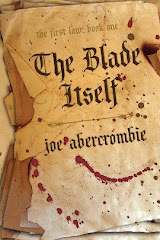.jpg)




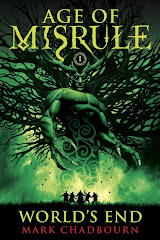.jpg)










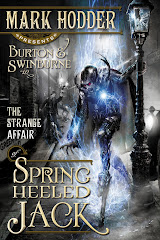


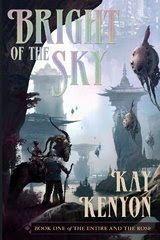.jpeg)
.jpg)











.jpg)














.jpg)



.jpg)




